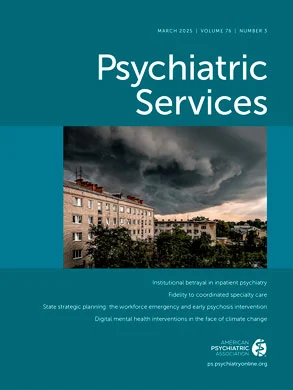To the Editor: Some studies have questioned the value of longer-term inpatient treatment for combat-related posttraumatic stress disorder (PTSD). The Program Evaluation Center of the Department of Veterans Affairs reported worsening of patient-rated symptoms after discharge compared with symptoms prior to admission; however, violent thoughts and actions and legal problems were diminished at discharge (
1).
In 1992 a specialized inpatient PTSD unit was established at the Miami VA Medical Center to provide rehabilitative treatment for combat-related PTSD. The length of stay for an initial treatment episode was 12 weeks. The program predominately featured group interventions focused on processing trauma and the development of anger management and other interpersonal skills. To further explore which outcomes could be affected by rehabilitative treatment, we supplemented the monitoring procedures developed by the VA Program Evaluation Center with self-report and interviewer-based assessments of symptom severity and functional adjustment.
Patients presenting for consecutive admissions to the PTSD program over a 12-month period between 1996 and 1997 were evaluated during the month preceding admission and in the fourth month following discharge. The final sample of 26 patients represented 87 percent of the 30 patients evaluated; two did not complete the program, and two were lost to follow-up. All were male combat veterans (24 from Vietnam, one from Korea, and one from the Persian Gulf) with a mean age of 49.2±4.9 years and an age range of 38 to 64 years. Twelve (46 percent) were white, seven (27 percent) were non-Hispanic blacks, and seven (27 percent) were Hispanic. Eleven subjects (42 percent) were married at the time of program admission.
Structured assessment confirmed diagnoses of combat-related PTSD. Twenty-three subjects (88 percent) also met criteria for lifetime major depression. Twenty-two (85 percent) met lifetime criteria for alcohol or substance use disorders, and 11 (42 percent) met criteria for such disorders within the past year. All subjects were taking psychoactive medications, which were adjusted during their stay in the program.
Besides collection of self-report symptom ratings, the Longitudinal Interview Follow-up Evaluation (LIFE) (
2) was administered by one of two master's-level psychology technicians who had been trained by clinical staff. The LIFE measures functioning in the context of employment, intimacy, and interpersonal relationships on a 5-point scale ranging from 1, absence of impairment, to 5, severe impairment. Evaluation of alcohol and substance use was supplemented by record review, including toxicology screens, and input from outpatient clinicians.
At four-month follow-up after discharge from the PTSD program, none of the subjects had been rehospitalized. Sixty-nine percent indicated complete satisfaction with their treatment in the program, and 15 percent indicated they were "pretty much satisfied." Mean ratings of PTSD and depression were unchanged. While other subscales showed a trend toward improvement, LIFE ratings for interpersonal functioning with family members improved significantly, from 3.2±1.1 at preadmission to 2.7±.9 at follow-up (t=3.61, df=25, p<.001). Only one of the subjects who had abused substances in the preceding year was found to have relapsed.
These findings are far from definitive due to the limited number of subjects, unblind assessment, a single follow-up time period, and absence of a comparison group. However, the subjects' improvement in their relationships with family members stood out. We postulate that the improvement may be a carryover from having learned to apply interpersonal skills in the patient community. This possibility, along with cost considerations, influenced the decision in 1997 to restructure the program to a residential format with a three-month length of stay, rather than maintaining it as an inpatient program. In the residential format, patients function as an autonomous community on evenings, nights, and weekends. Our expectation is that this experience will further promote learning of interpersonal skills and problem solving, thereby maintaining or enhancing the program's possible benefit to interpersonal relationships with family members.

